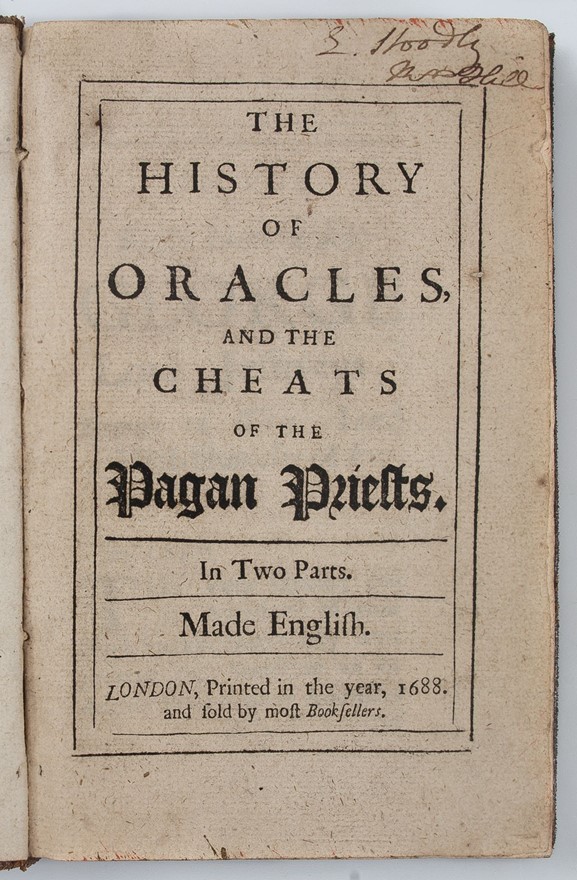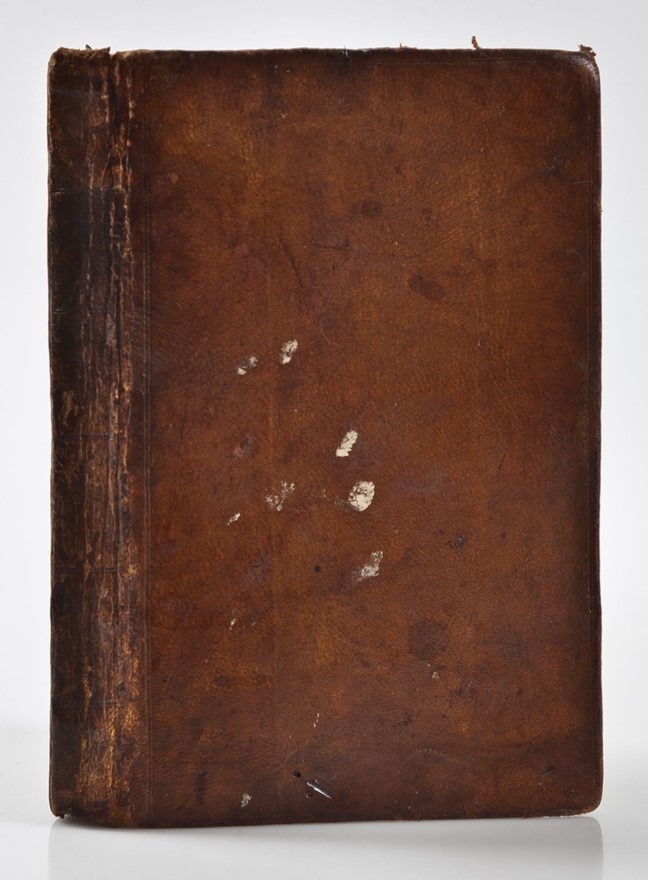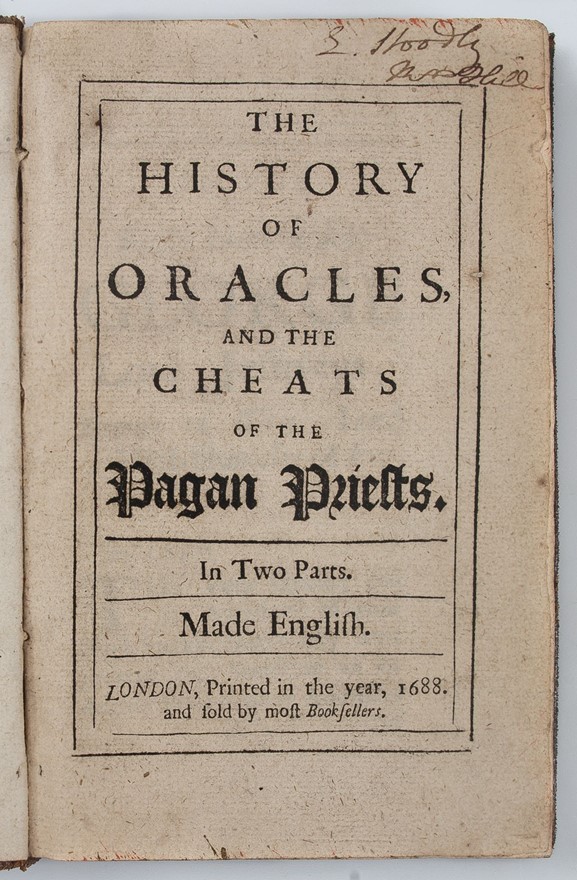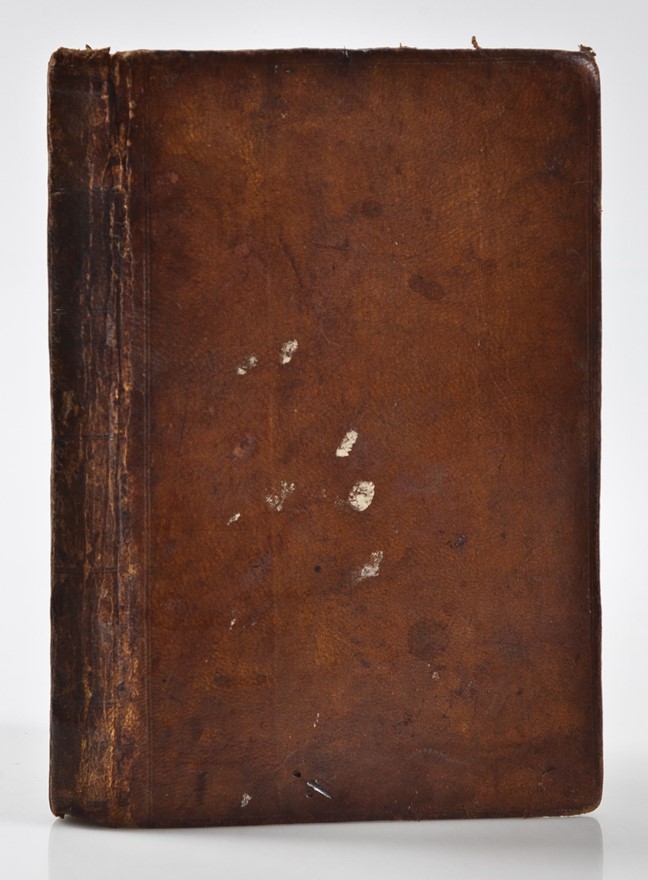The History of Oracles,
Fontenelle Bernard Le Bovyer (1688)
£750.00 [First Edition]
Please contact us in advance if you would like to view this book at our Curzon Street shop.
and the Cheats of the Pagan Priests. In Two Parts. Made English [by Aphra Behn].
First Edition in English. 8vo. [Text: 170 x 107 mm]. [20], 227, [5]pp. Contemporary plain sheep, covers ruled in blind; plain endleaves; red edges (joints and spine rubbed, a two-inch long narrow worm-trail chewed through the leather and exposing the pasteboard on the back cover, edges rubbed).
London: in the Year,
Wing F1413 (L,O,LL,SP;CH,CN,LC,MH,TU,Y). The dedication by the translator Aphra Behn (though signed "A. B.") to George Jeffreys, Baron Jeffreys of Wem, better and more-notoriously known as Judge Jeffreys, is (in almost immediate hind-sight) a triumph of sycophancy. The infamous hanging-judge, responsible for the "bloody assizes" in the wake of Duke of Monmouth's rebellion, is here addressed (in the same year as his downfall with his royal master James II) in the most glowing terms: "Methought when all the honest part of the World was full of your Praise, when all that profess Loyalty were Celebrating your never dying Name, I shou'd have lookt upon my self as unworthy of the Honour I now aspire to, if I amongst the number, shou'd not with all imaginable gratitude pay my acknowledgments for the good you have rendered the publick, as well as for the Services you have rendred the Crown; which you have more effectually done, with more noble Bravery, Fortitude and Resignation, than any other great States-man ..." and so on. In December 1688, two days after King James had fled London, he was captured attempting to flee overseas in disguise as a common sailor and imprisoned in the Tower. He died there in April 1689 being buried, temporarily and ironically, next to the Duke of Monmouth. Behn's dedication, is unsurprisingly, removed from the second edition (1699) and replaced with to the Earl of Carbery by the publisher Samuel Briscoe, though he does promote her name as translator. to the title-page.
"My design is not to give you directly an History of Oracles; I only intend to argue against that common Opinion which attributes 'em to Daemons, and will have 'em to cease at the coming of Jesus Christ.In doing this 'tis necessary that I run through the whole History of Oracles, that I unfold their Originals, their Progress, the different Manners in which they were deliver'd; and lastly their Decay, with the same exactness as if I were in these matters pursuing the natural and Historical Order." (p. 1).
In the preface to his new translation (London, 1750; reprinted Glasgow, 1753), Stephen Whatley criticizes Behn's translation, though unaware of her name or sex as in the first edition the dedication wass signed only with her initials: "The former Edition of it in English was apparently done by a Person who, however, skilled in the French language, was intirely unacquainted with the Idiom of ours; as is evident not only from the Gallicisms in almost every Period, but from his [sic] mistaking the Sense of his Author in some Places, and rendering it in others quite ambiguous." Despite this claim it is clear that Whately's translation is little more than a revised version of Behn's rather than a completely new effort.
Fontenelle's Histoire des Oracles (1687), distilled from Antonius van Dale's De oraculis ethnicorum dissertationes duae, is forgotten today, though Henry Hallam thought it, "worthy of observation as a sign of the change that was working in literature. In the provinces of erudition and of polite letters, long so dependent, perhaps even so hostile, some tendency towards a coalition began to appear. The men of the world, especially after they had acquired a free temper of thinking in religion, and become accustomed to talk about philosophy, desired to know something of the questions which the learned disputed; but they demanded this knowledge by a short and easy road, with no great sacrifice of their leisure or attention. Fontenelle, in the History of Oracles, as in the dialogue on the Plurality of Worlds, prepared a repast for their taste. A dull work, of a learned Dutch physician, Van Dale, had taken up the subject of the ancient oracles, and explained them by human imposture instead of that of the devil, which had been the more orthodox hypothesis. A certain degree of paradox, or want of orthodoxy, already gave a zest to a book in France; and Fontenelle's lively manner, with more learning than good society at Paris possessed, and about as much as it could endure, united to a clear and acute line of argument, created a popularity for the History of Oracles, which we cannot reckon altogether unmerited." - Introduction to the Literature of Europe (1839), IV, p. 503.
Provenance: Early signature at the head of the title: "E. Hoodly, Mrs Hill"; early inscription on the rear flyleaf in a secretary hand "Ex lib. James Hill". James Stevens Cox, F.S.A (1910-87), bookseller and bibliophile [no marks of ownership].
Stock Code: 55508







